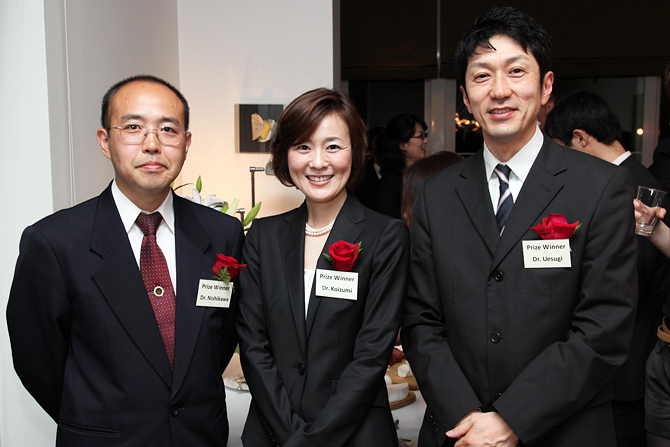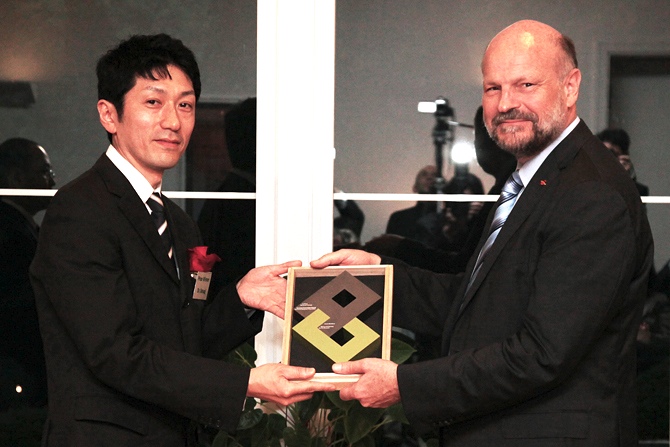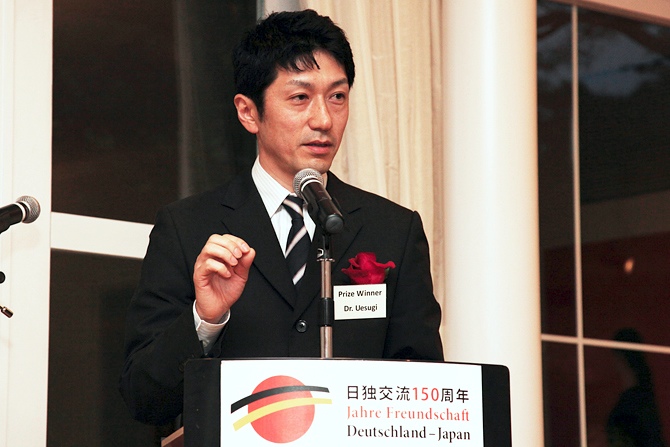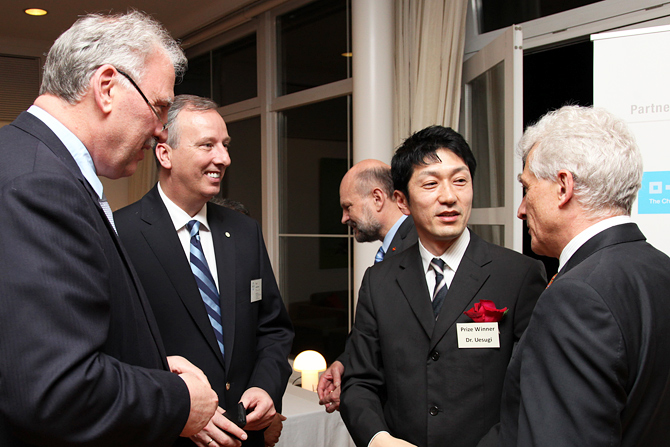Prof. Uesugi Awarded German Innovation Prize

- From Prof. Uesugi's Speech
- 1st Prize Team Members
- The Award-Winning Topic
- Award Ceremony Photos
- Related Links
- Media Coverage
May 12, 2011
In a ceremony on the 12th at the German Ambassador's residence in Tokyo, Prof. Motonari Uesugi of Kyoto University's Institute for Integrated Cell-Material Sciences (iCeMS) was presented with first prize in the German Innovation Awards, "Gottfried Wagener Prize 2010". Sponsored by the German Chamber of Commerce and Industry in Japan (GCCIJ) and twelve German member corporations, one second prize and three third prizes were also awarded.
Prof. Uesugi was honored for his research into the "Development of Small Molecule Tools for Cell Therapy".
Second prize went to Prof. Akira Ohtomo of the Graduate School of Science and Engineering, ![]() Tokyo Institute of Technology, and the third prizes to Assoc. Prof. Jun Takeuchi of the
Tokyo Institute of Technology, and the third prizes to Assoc. Prof. Jun Takeuchi of the ![]() Institute of Molecular and Cellular Biosciences, The University of Tokyo, Dr. Masayoshi Higuchi of the World Premier International Center for Materials Nanoarchitectonics,
Institute of Molecular and Cellular Biosciences, The University of Tokyo, Dr. Masayoshi Higuchi of the World Premier International Center for Materials Nanoarchitectonics, ![]() National Institute for Materials Science, and Assoc. Prof. Takashi Yatsui of the
National Institute for Materials Science, and Assoc. Prof. Takashi Yatsui of the ![]() School of Engineering, The University of Tokyo.
School of Engineering, The University of Tokyo.
The Gottfried Wagener Prize was established in 2008 to spark innovation through cooperation between industry and academia in Germany and Japan. The applicants, researchers aged 45 and under, must be involved in applied research in the fields of energy and the environment, healthcare, or safety and security. In this third year of the award, 81 applications were submitted from 36 universities and research institutions.
At the award ceremony, a commemorative speech was delivered by Dr. Hiromitsu Muta, Executive Vice President for Finance at the Tokyo Institute of Technology, entitled "Gottfried Wagener's Contribution to Education and Innovation in Japan". Subsequently, prize jury chairman Dr. Masuo Aizawa, an executive member of the ![]() Council for Science and Technology Policy of the Japanese Cabinet Office, spoke on procedures used for evaluation and also paid tribute to the work of the prize winners.
Council for Science and Technology Policy of the Japanese Cabinet Office, spoke on procedures used for evaluation and also paid tribute to the work of the prize winners.
Further details of the ceremony and prize-winning research are available at the prize announcement's website, below.
From Prof. Uesugi's Acceptance Speech
"There is great hope that cell therapies may be the key to curing diseases that are beyond treatment with current medical practices. Not all patients, however, will be able to benefit from such therapies due to their high cost. We have therefore focused our research on lowering costs by utilizing chemical compounds that can be mass-produced. We believe that cell therapies based on these methods will be available for clinical use in 10 to 20 years."
First Prize Team Members
- Dr. Noriko Koizumi
Professor, Graduate School of Life and Medical Sciences, Doshisha University
Graduate School of Life and Medical Sciences, Doshisha University - Dr. Makiya Nishikawa
Associate Professor, Department of Biopharmaceutics and Drug Metabolism, Graduate School of Pharmaceutical Sciences, Kyoto University
Graduate School of Pharmaceutical Sciences, Kyoto University - Dr. Motonari Uesugi
Professor, iCeMS, Kyoto University

From left: Assoc. Prof. Nishikawa, Prof. Koizumi, Prof. Uesugi
Prof. Uesugi's Award-Winning Topic:
Development of Small-Molecule Tools for Cell Therapy
Bioactive small molecules have been used as medicines, agrochemicals, and biological tools throughout human history. Prof. Uesugi and his team have proposed a new way to use synthetic small molecules: as tools to improve the efficacy and productivity of cell therapies.
Taking advantage of technology available in fields ranging from organic chemistry to clinical medicine, the team seeks to discover and use synthetic small molecules that modulate fundamental processes in human cells, specifically small-molecule adhesion factors and small-molecule growth factors. Their goal extends beyond the discovery of clinically useful molecules, to include design innovations and chemical synthesis that will lead to new, broad, and cost-effective general applications of synthetic organic molecules.
Prof. Uesugi's discovery has made possible the investigation of complex cellular events and the improvement of cell therapies. The team has already discovered a synthetic small molecule, "adhesamine", which boosts adhesion and growth of cultured human cells. Using this molecule as a seed, Prof. Uesugi and colleagues designed a synthetic molecule that behaves just like fibronectin, a naturally-occurring protein commonly used in a range of fields from basic biology to cosmetics.
The team has additionally shown that it is possible to replace fibronectin, a large protein, with a synthetic compound appropriate in size for mass chemical production. The development of this "small molecule fibronectin" is a groundbreaking contribution to chemistry, biology, and medicine.
Award Ceremony Photos

Prof. Uesugi (left) receiving the prize plaque from GCCIJ Executive Director Manfred Hoffmann

Prof. Uesugi delivering his acceptance speech

Foreground from left: Dr. Karl Roeser, Representative Director, Chairman and President, ![]() Merck Ltd. Japan, Hans-Dieter Hausner, Senior Representative for Japan and President and Representative Director,
Merck Ltd. Japan, Hans-Dieter Hausner, Senior Representative for Japan and President and Representative Director, ![]() Bayer Holding Ltd., Prof. Uesugi, and German Ambassador Dr. Volker Stanzel
Bayer Holding Ltd., Prof. Uesugi, and German Ambassador Dr. Volker Stanzel
Related Links
 German Innovation Award "Gottfried Wagener Prize"
German Innovation Award "Gottfried Wagener Prize" German Chamber of Commerce and Industry in Japan (GCCIJ)
German Chamber of Commerce and Industry in Japan (GCCIJ)
Media Coverage
- Nikkan Kogyo Shimbun (May 27, 2011)
- The Science News [Tokyo] (May 20, 2011)
- Petro-Chemical Press [Tokyo] (May 16, 2011)
- Kyoto Shimbun (May 14, 2011 page 27)
 NikkeiBP Tech-On! (May 13, 2011 web)
NikkeiBP Tech-On! (May 13, 2011 web)
